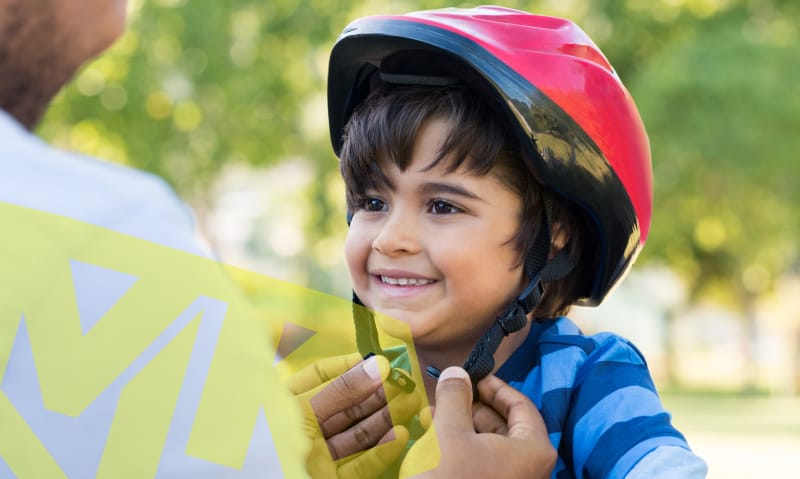5 Ways Parents Can Help Prevent Their Children’s Injuries

Protect your child from dental injuries.
Trips, slips, and falls seem to be inevitable in children, but there’s a lot we can do to help limit and prevent them. Check out these 5 tips from Must Love Kids on how you can protect your child from injuries.
1. Encourage play on safe surfaces.
Take a look around the areas your child plays: Is the playground riddled with holes and ruts that might cause kids to fall or trip? Does your little one’s playroom have furniture with sharp, exposed corners? To reduce the chances of injury, encourage your child to play on safe surfaces.
Make sure your child’s playroom has enough uncluttered space to move and play, and teach your little one to pick up their toys to help prevent tripping. You should also try to visit playgrounds with sufficient shock-absorbing material like wood chips, pebbles, or rubberized pathways. For kids participating in high-impact sports, like running and basketball, tracks and basketball courts can be more forgiving on the joints than concrete.
2. Talk about safe play and how it prevents injuries.
Many parents may not know this, but they should actually teach their children what appropriate play looks like and praise them when they play accordingly. Make sure your little one knows not to aim balls, frisbees, and other play items at someone’s head and to be on the lookout for the same with other kids.
Encourage your child to learn the general rules of a game and how to stay safe before starting a new sport. Rehearsing safety situations with your child can also help hone their self-protective instincts. Use scenarios like, “What would you do if your ball rolled out into the street?” or “What would you do if another child sat at the top of the slide and refused to go down?”
Try not to laugh when your child comes up with a wild answer because there’s a big chance they aren’t trying to be funny. Instead, commend your child for their out-of-the-box thinking, then offer a better alternative. Always remember to remind your child that practicing safe play isn’t intended to spoil their fun, only to keep them safe and prevent injuries.
3. Get your child protective gear.
Sometimes it’s not enough that your child plays in a safe environment and follows the general rules of a game; they may also need to have the right protective gear. Don’t let your child play baseball without a catcher’s mitt or allow your football player to compete without a helmet. And when you see someone else doing something “unsafe,” talk about it with your child.
For instance, if you see someone skating without a helmet or knee pads, bring your child’s attention to the lack of protective wear and remind them of the injuries that could happen if the person were to fall. Because of the high risk of dental injury in contact sports, you’ll also want to get your child a mouth guard they can wear during both practice and regular games. You can buy one at most retail or sporting goods stores, but these often don’t provide the best fit or complete protection.
A custom-fitted mouth guard from a dentist, although a bit more expensive, will not only be more comfortable to wear, but it will also cost less than treatment for traumatic dental injuries.
4. Set up guidelines about things that do and don’t go in the mouth.
Just by looking at them, there’s not much difference between a cheerio and a stacking ring— at least for a two-year-old. Adults and older kids may know what goes in the mouth (namely food) and what doesn’t, but for younger kids, that distinction isn’t always so clear.
Restricting eating to specific areas like the dinner table can help your child learn the difference between what’s edible and what’s not. Each time you introduce a new toy, it’s also important to remind your child that toys don’t go in their mouth. You can say something, like “That’s a toy. We don’t put toys in our mouths.”
5. Teach good oral hygiene.
Perhaps one of the easiest ways to prevent dental injuries in kids is to keep your little one’s teeth strong and healthy. Teach your child how to properly hold a toothbrush and the correct way to move the bristles over their teeth to effectively eliminate plaque.
Buying your child fun supplies like strawberry toothpaste or a superhero toothbrush can also help turn this everyday chore into an exciting time for your kids. Sometimes convincing your child of the benefits of good oral hygiene can prove challenging, particularly in older kids.
When scheduling an appointment with us, share any concerns you may have about your little one’s oral routine. Our Must Love Kids team has a wealth of experience guiding parents on how to teach great oral hygiene habits to their children.
Let’s help keep your child’s teeth strong and protect their oral health together!